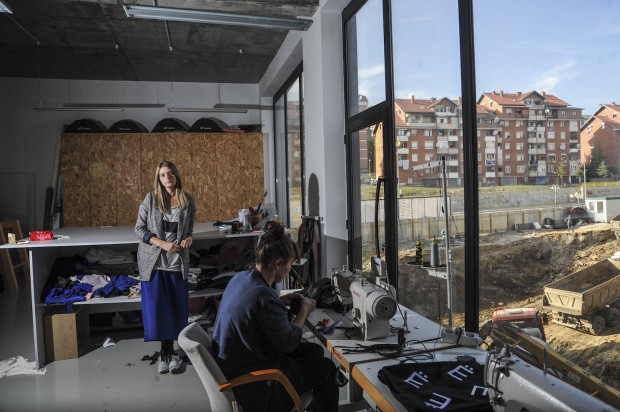

Visiting Venera Mustafa’s shop in the Prishtina’s new hub
Amidst a block full of tall residential high-rise buildings, a narrow passage next to a Meridian Express and a Five Star Gym leads to an inner courtyard with a couple of benches. Lovers hold hands, children play, and, in a far corner, a few ephemeral-looking garments hang in a window shop. This is the unassuming and well-hidden studio of Venera Mustafa, a Kosovar designer who has gained a respectable crowd of faithful customers.
The studio, opened in November 2013, houses the designer’s retail store in the front and a workshop in the back. When it first opened the shop stood alone in a ghost town, the block of the residential buildings on the newly paved Street B not yet inhabited. Today, the area feels drastically different, having turned into a high street of Mat 1, one of Prishtina’s newly built neighborhoods.
“I didn’t expect for it to become so dynamic so fast,” says Mustafa, sitting behind a desk chock-full of books and Mustafa’s woolen clutches/laptop sleeves. “I can never find a parking spot anymore,” she complains. Her own shop, where one can now purchase her latest autumn-winter 2015-16 collection and spring-summer collection 2016, seems quite deserted in contrast.
Mustafa, who studied sculpture in Prishtina and specialized in menswear in Paris, seems to have escaped the crowds on purpose. An exclusively ready-to-wear designer, she first opened shop on the lively Fehmi Agani street, where the majority of the city’s hip bars and restaurants are located. She was tired of people coming in and expecting to find wedding dresses. One of them had even asked whether she has anything for non-pregnant women, she recounts chuckling.
It is true that Mustafa’s style stands in stark contrast to the contours seen in the city: most of her clothes, which are made with high quality wool, silk or cotton, are loose and pay little attention to emphasizing the waist or hips. Straight and tailored lines, which are often inspired by traditional Albanian garments, make Mustafa’s stuff look very modern. Unlike her peers, who survive on evening wear, catering to a small scene of celebrities, Mustafa creates casual clothes with an oomph. It is hard to compete for room in a market saturated with cheap designer knockoffs, especially when Mustafa’s price-range is well above, say, Mango.
“There is no industry [in Kosovo], but there is a small fashion scene,” explains Mustafa, whose business relies on regular customers rather than mass appeal. Her clothes, which cost from 50 to 250 euros, are produced in limited quantities, and the small shop has a regular injection of new stuff. Her last collection called ‘Sonder,’ composed of fragile-looking pink dresses and overcoats made of silk organza hangs around us in the studio. On another rack, the entirely metallic winter collection looks both futuristic and wearable, not least of all the hand painted silver coat by Bujar Sylejmani, a local artist.
“I want my clothes to have that ‘wearable touch,’” says Mustafa, whose debut collection in Prishtina, Laboratori Sorra, was presented as an art installation in the garden of the Ethnography Museum in 2010. She has come a long way since then, editing her work from heavy mixes of patterns, colors and accessories, into streamlined garments which showcase the fabric, specific color palettes, and most impressively, custom-made art pieces.
Her interest in producing wearable art seems to fuel her collaborations with a series of local artists whose work ranges from photography to illustrations.
“I collaborate with many people I used to go to school with,” explains Mustafa, who studied art immediately after the 1999 war. “There was nothing, we had no studios to speak of, we just hung out.” In school she met Sylejmani, the last contributor to her mesh of art and fashion, as well as Jakup Ferri and Alban Muja with whom she had worked on previous collections. Majlinda Hoxha, who contributed with photography, is a close friend too.
“What I do is really for a niche market,” she explains, adding that this is the only way she knows how to function, fully aware that her work might be more at home in Basel or Paris, where she has presented her work in galleries and concept stores.
Two petite women, whom I recognize from TV, enter the shop and start checking the clothes out. While they ooh and aah over the raincoats and dresses, we take a break. They try on stuff and Mustafa gets up and assists them, fixing up sleeves when too long. Tittering, they promise to come back once the salaries are in. Bidding them farewell, Mustafa doesn’t seem concerned. After all, she knows her customer base well – they do come back.
01 December 2015 - 12:00

Kosovo’s Hardh Fest returns for its 10th anniversary, offering three...

Most attendees praise the new out-of-town site of Kosovo’s Sunny Hil...

You might have read that Yahoo article about how the best macchiatos i...

Crepes, American pancakes and waffles meet Turkish baked potato dishes...

In its fifteenth edition, the Anibar International Animation Festival,...

Most attendees praise the new out-of-town site of Kosovo’s Sunny Hil...

You might have read that Yahoo article about how the best macchiatos i...

As the pandemic hit, Adelina Bikliq began posting recipes on Instagram...